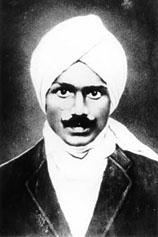
C. Subramania Bharati. |
On February 10, 1914, an open letter was published in The Hindu under the heading Police Rule In India. It was written by C. Subramania Bharati, and addressed to James Ramsay MacDonald, Leader of the British Labour Party.
In his letter, Bharati detailed how he was hounded by the British police, their informers, and spies during his stay in Pondicherry.
It was a long letter and stated among other things,
"Dear Sir, From the middle of the year 1906 to the month of August 1908, I was working as a special contributor to a weekly Tamil Journal, India by name, which was published in Madras. In the latter year, the Government thought it fit to prosecute that journal for sedition.
"I was not the person responsible for the conduct of the Journal and so, of course, they sent another man to gaol.
"I quit Madras a few days after the India prosecution commenced, as many of my friends informed me that keen disappointment was felt by some high placed officials at their inability to find something which would enable them to send me to prison and that the Police were trying to fabricate false evidence against me. An impartial and thorough student of the history of our times like yourself could not but be aware how mercilessly and deliberately the peaceful nationalist movement was suppressed in that year, thus making room for what neither the Government nor the Nationalists really wanted, viz. terrorist violence."
In the letter Bharati recounts the Ashe murder incident and says, ". . . as though to encourage the inventive skill of the Madras Police, Vanchi Iyer committed suicide, leaving no clue whatsoever as to the possible abettors."
He continues with a touch of humour, "The lower Police, to whom, by the way, political motives and political crimes were, and still are, as strange and unfamiliar as Differential Calculus, at once imagined that the newspapermen who had been talking 'Swadeshi' on the sands of the Madras Beach three years before must be at the bottom of the whole thing; for, had they not shown their bias for disregarding the law by refusing to swallow the benefits of that angelic Section 124-A of the Indian Penal Code as interpreted by the Pinheys of the day?
"During the trial of the Ashe murder case at the Madras High Court, I could get some glimpses into the sort of 'evidence' which made the Police suspect me as a possible abettor."
Bharati continues, after stating a few more facts, "The only charge which the Police could maintain against these acquitted men was that they were found in possession of books published by me! And, of course, I was guilty because they had my books! Q.E.D."
After talking about censorship by the postal services, Bharati says, "After the arrival of Lord Pentland as Governor of Madras, I noticed a partial change in the atmosphere of the local post office and concluded, rightly, that the influence of the spies on the postal service had gone down considerably. This encouraged me to write a long appeal to H.E. Pentland and and send it by post. In that appeal, I narrated all the facts of my case, also appending copies of certain documents which, I felt sure, would give His Excellency insight into the character of the lower Police and their happy freedom from all notions of legality and moral rectitude..."
Bharati concludes with an earnest appeal, "I make this appeal to you, Sir, who, as chief of the Labour Party and as very sober and thoughtful statesman, wields a considerable influence for good on English public opinion, to do all that you can in the way of strengthening Lord Pentland's hands in rendering me justice, and in withdrawing measures adopted against me on the strength of incredible, absurd and unscrupulous reports."
This letter figured in a discussion in the then Madras Legislative Assembly, the issue having been brought up by the well-known advocate and member of the Assembly, P.V. Narasimha Iyer, on April 2, 1914. He asked if the letter was brought to the attention of the Government and if so what the result was.
But the Government as usual replied that the letter was an appeal and was, therefore, as per rules sent to the legal wing and action could be taken only if Bharati, considered a fugitive, returned to British Indian territory and appealed again. In fact the Government added that since there were other cases against Bharati, they would have to be inquired into, too.
Learning about this, Bharati wrote a letter to The Editor, The Hindu, published on April 8, 1914: In that letter he asked at the end, "I have made certain definite charges against the Madras Police. Is my presence essential in British India for the Government to hold an enquiry into the conduct of the police?"
All this fell on the deaf ears of the British Government in India!
|